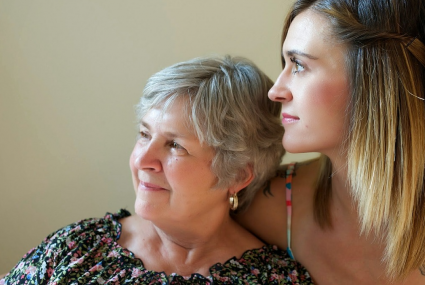When a loved one is diagnosed with dementia, it signals the start of a period of big changes for both them and you. Adjusting to these changes can seem stressful at first, but by being flexible and staying positive, you can give them the care they need to keep them happy and safe. These tips and techniques will enable you to support your loved one and adjust to these lifestyle changes together.
What is Dementia?
Dementia is term used to describe a progressive brain disorder that effectively changes how the brain works. It can be caused by a variety of other conditions and can display many different symptoms, including memory loss, difficulties with thinking, problem-solving, language and communicating. Dementia can cause mood swings and sometimes even change a person’s behaviour and personality. While a dementia diagnosis may seem overwhelming at first, there are many strategies you can use to make it easier to communicate with and care for a loved one with dementia.
New Communication Techniques
Because dementia changes the way the brain works and processes things, we need to adjust the way we communicate with our loved ones who are dealing with dementia. It’s important to remember that how you behave can often guide them on how to behave. Try to always keep things positive; your tone of voice, body language and facial expressions should be happy and relaxed.
It also helps to minimize distractions when you’re speaking with them. It’s easier for them to follow and understand you when they only have one thing to pay attention to. Turn off the television, music, and try to minimize the noise levels so your loved one can truly concentrate. It’s important to always make sure you get their attention before you start to speak, and it’s a good idea to start the conversation by stating your name and relationship to them to remind them of who you are.
Make sure you keep your message clear and simple. Ask questions one at a time and give them plenty of time to answer before you move on in the conversation. Make sure your voice is always a calm, soothing presence. Also, try to keep it light when you can. Try to make them laugh! After all, everyone loves the feeling of sharing a good laugh together.
Behavioural Changes
When you notice any behavioural changes, always check with the doctor first, as they could be happening due to medical reasons. It’s important to remember that you can’t change this new behaviour, but you can control how you respond to it. Where possible, try to accommodate this new behaviour. When they do something, there’s likely a reason behind it. They might be trying to tell you something, or express a need. If there’s a way you can make things easier for them by accepting and accommodating these changes, everyone will benefit.
It’s also good to remember that dementia is a condition that changes often, and what works one day might not work the next. Try to be adaptable and flexible where you can.
Day to Day Activities
As the condition progresses, you may notice that your loved one requires more assistance with day to day activities. They might forget to eat, not remember how to dress themselves, or require assistance with daily hygiene activities like bathing and brushing their teeth. If you notice that your loved one is forgetting these things, there are ways you can help them to remember.
For example, you can choose their clothes with them each morning and lay out everything they need to get ready for the day. Do the same at bedtime to establish a routine. At mealtime, eat with them so they can see and follow your actions, and make sure you cut and season food for them before serving. It’s always best to let them do these things on their own with your assistance, since maintaining a level of independence is important.
How Bria Communities Cares for Residents with Dementia
At Bria Communities, we are experienced with providing care for residents with dementia, and understand that each resident has unique care needs. When your loved one requires extra support, we offer BriaCare™ at two of our communities; Magnolia Gardens in Langley and The Waterford in Tsawwassen.
BriaCare provides a range of care services to our residents in a manner that respects, supports and empowers each individual, while maintaining dignity and peace of mind. Our goal is to ensure residents are happy and healthy, which is why we encourage our residents to stay active take part in planned social and recreational programs. Everyone can participate in these activities — regardless of physical challenges — as all programs are adapted to match individual needs and abilities.
We are members of the Alzheimer Society of British Columbia, and host Coffee Break® fundraising events in support of our local Alzheimer Society. These events bring together friends, families, co-workers, and the entire community to raise funds for research into the causes and cure for dementia, as well as support for local programs and services that help people, and their caregivers, live well with the disease. Our most recent event was our special Hot Dog Day at The Wexford, put on by a Bria Communities staff member, in memory of his grandmother who lived with Alzheimer’s.

Comments